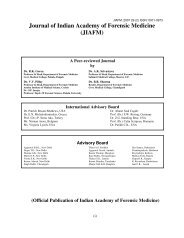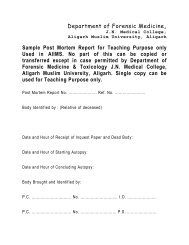Download - forensic medicine
Download - forensic medicine
Download - forensic medicine
Create successful ePaper yourself
Turn your PDF publications into a flip-book with our unique Google optimized e-Paper software.
JIAFM, 2007 - 29(4); ISSN: 0971-0973<br />
The Responsibility on the Shoulders of Courts and Doctors to Provide<br />
Proper Legal Protection to Rape Victim<br />
*Dr. O.P. Aggarwal, **Dr. A.D. Aggarwal, ***Dr. Harpreet Singh<br />
*Professor & Head, Forensic Medicine Department, Medical College, Mullana<br />
**Assistant Professor,Forensic Medicine Department, Medical College, Mullana<br />
***Assistant Professor, Forensic Medicine Department, Medical College, Mullana<br />
Abstract<br />
Rape is not only a crime against the person of a woman; it is a crime against the entire society. It destroys, as<br />
noted by the Supreme Court [1], the entire psychology of a woman and pushes her into deep emotional crisis. It is<br />
a crime against basic human rights, and is also violative of the victim's most cherished of the Fundamental Rights,<br />
namely, the Right to Life contained in Article 21 of the Constitution of India, 1950. The low rate of convictions in<br />
cases of rape raises serious questions about the workings of the law. The amendments seem to have had little<br />
effect and merit closer examination. There is reluctant recognition of the amendments and its swamping under<br />
pre-conceived notions. After more than two decades since legal reforms gave rape victims more leverage in the<br />
courtroom; we need to change society’s attitude towards rape.<br />
Introduction:<br />
It is unfortunate that respect for womanhood in our<br />
country is on a decline and cases of molestation and<br />
rape are steadily growing. Decency and morality in<br />
public and social life can be protected only if courts<br />
deal strictly with those who violate the social norms.<br />
Sexual violence apart from being a dehumanizing<br />
act is an unlawful intrusion on the right of privacy<br />
and sanctity of a female. When a woman is<br />
ravished, what is inflicted is not merely a physical<br />
injury but the deep sense of some deathless shame.<br />
The physical scar may heal up, but the mental scar<br />
will always remain.[2] The offence of rape is in<br />
simplest term is ‘the ravishment of a woman without<br />
her consent by force, fear, of fraud’ or as ‘the carnal<br />
knowledge of a woman by force against her will’.<br />
While the murderer destroys the physical frame of<br />
his victim, a rapist degrades and defiles the soul of a<br />
helpless victim.[3]<br />
To insist on corroboration except in the rarest of rare<br />
cases is to equate one who is a victim of the lust of<br />
another with an accomplice to a crime and thereby<br />
insult womanhood. Corroboration is not the sine quo<br />
non for conviction in a rape case. Refusal to act on<br />
the testimony of the victim of sexual assault in the<br />
absence of corroboration as a rule is adding insult to<br />
injury.<br />
The amendments:<br />
The alarming frequency of crime against women led<br />
the parliament to enact Criminal Law Amendment<br />
Act 1983 (act 43 of 1983) to male the law on rape<br />
more realistic. By this act, sections 375 and 376 IPC<br />
were amended and certain more penal provisions<br />
were incorporated for punishing such custodians<br />
who molest a woman under their custody or care.<br />
Section 114A IEA was also added in the Evidence<br />
Act for drawing a conclusive presumption as to the<br />
absence of consent in certain prosecutions for rape,<br />
involving such custodians. Section 327 of the Code<br />
of Criminal Procedure which deals with the right of<br />
the accused to an open trial was also amended by<br />
the addition of sub-sections (2) and (3).[4] The<br />
amended provisions of the Section 327 Criminal<br />
Procedure Code impress upon the Presiding<br />
Officers to hold the trial of rape cases ‘in camera’<br />
rather than in open court.<br />
When the sexual intercourse is admitted by the<br />
accused but with consent, but victim states in her<br />
evidence before court that the act was done without<br />
her consent; then the court will presume that she<br />
had not given the consent as per amendment 114A<br />
Indian Evidence Act in cases of custodial rape. So<br />
admitting sexual intercourse with consent is suicidal<br />
for the accused.<br />
The offence of rape occurs in Chapter XVI of the<br />
Indian Penal Code. It is an offence affecting the<br />
human body. Sections 375 and 376 have been<br />
substantially changed by Criminal Law (Amendment)<br />
Act 1983 and several new sections were introduced<br />
by the new act, i.e. 376-A, 376-B, 376-C and 376-D.<br />
The fact that sweeping changes were introduced<br />
reflects the legislative intention to curb with iron<br />
hand, the offence of rape which affects the dignity of<br />
a woman.<br />
In view of the object of preventing social<br />
victimization or ostracism of the victim of a sexual<br />
offence for which the section 228A Indian Penal<br />
Code has been enacted. It makes the disclosure of<br />
identity of a victim punishable. The name of the<br />
victim is to be suppressed. The printing or publishing<br />
of any matter which may make known the identity of<br />
the victim can be punished.<br />
109


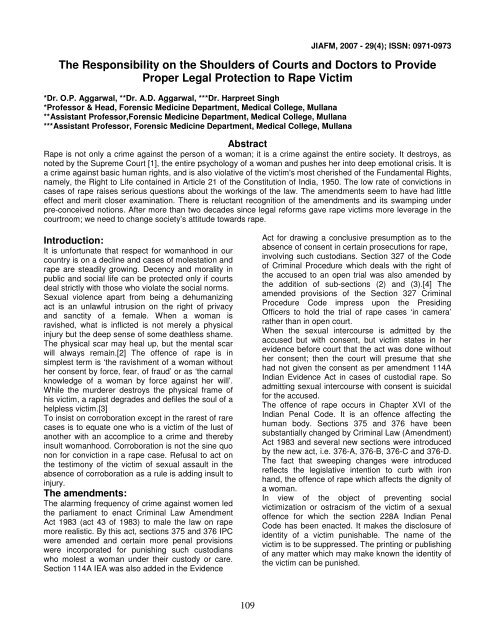
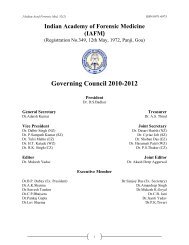
![syllabus in forensic medicine for m.b.b.s. students in india [pdf]](https://img.yumpu.com/48405011/1/190x245/syllabus-in-forensic-medicine-for-mbbs-students-in-india-pdf.jpg?quality=85)
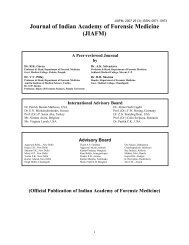
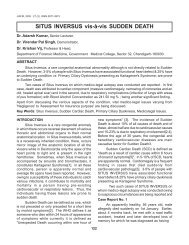
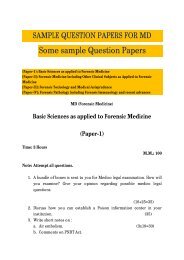
![SPOTTING IN FORENSIC MEDICINE [pdf]](https://img.yumpu.com/45856557/1/190x245/spotting-in-forensic-medicine-pdf.jpg?quality=85)
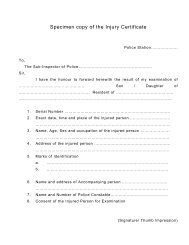
![JAFM-33-2, April-June, 2011 [PDF] - forensic medicine](https://img.yumpu.com/43461356/1/190x245/jafm-33-2-april-june-2011-pdf-forensic-medicine.jpg?quality=85)
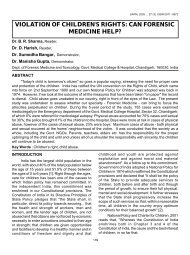
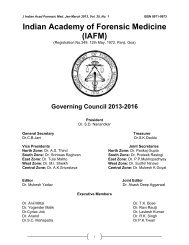
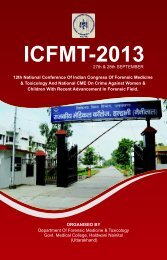
![JIAFM-33-4, October-December, 2011 [PDF] - forensic medicine](https://img.yumpu.com/31013278/1/190x245/jiafm-33-4-october-december-2011-pdf-forensic-medicine.jpg?quality=85)
